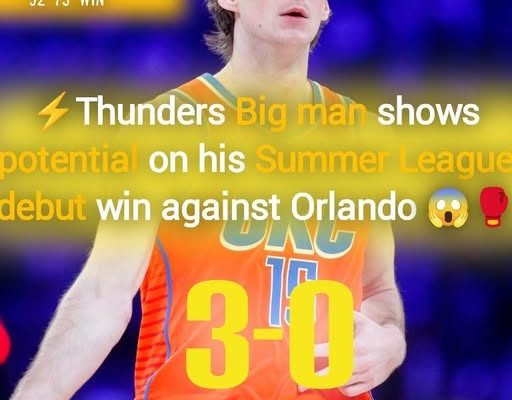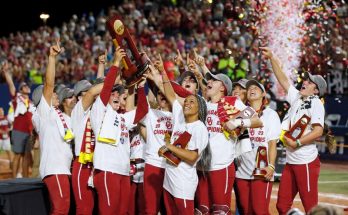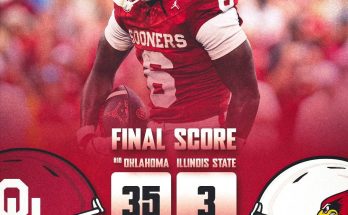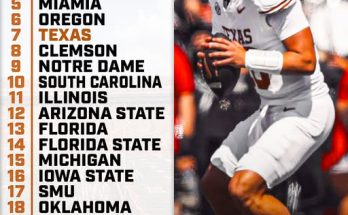The atmosphere inside the Thomas & Mack Center in Las Vegas was electric, buzzing with the promise of untapped potential, raw talent, and future stars looking to carve their place in the NBA. The Summer League has always been a platform for hopefuls to turn dreams into careers, and for the Oklahoma City Thunder, it became a showcase of what may lie ahead. In a matchup against the Orlando Magic, a new name demanded attention—Branden Carlson. Towering, sharp, and deceptively agile, Carlson’s performance became the centerpiece of the Thunder’s Summer League debut as he led them past a spirited Orlando squad. But to truly appreciate this breakthrough moment, one must take a step back and consider the journey, the mechanics of Summer League play, and why Carlson’s night meant so much for a franchise constantly evolving.
At 7 feet tall, Branden Carlson has long been a figure of intrigue for basketball scouts. A product of the University of Utah, he brought with him a collegiate resume filled with steady growth, shot-blocking prowess, and a developing perimeter game. But being a late bloomer or an undrafted big man in a league increasingly enamored with spacing, speed, and positional flexibility meant he had to fight harder than most to gain a foothold. Unlike lottery picks who arrive at Summer League already earmarked for rotation minutes, Carlson walked into the Thunder’s training camp with the pressure of performance. There would be no guarantees—only the grind.
From the opening tip, it was evident that Carlson wasn’t just there to fill minutes. His timing on screens, off-ball movement, and rim protection stood out immediately. Within the first five minutes, he had already tallied two rebounds, a tip-in dunk, and altered three shots on defense. But the defining aspect of his performance wasn’t just about stuffing the stat sheet—it was about presence. Every great big man owns the space around them, and on this night, Carlson looked every bit like a player asserting dominance on both ends.
The Oklahoma City Thunder have built a reputation over the last few years as a team with an elite scouting department, led by GM Sam Presti. They’ve been unafraid to take chances on players with unconventional development curves or under-the-radar college careers. In many ways, Carlson fits that mold—a skilled center who can step out and shoot threes, but also bang in the post, protect the paint, and play within a system. Against Orlando, the coaching staff tested his versatility. He was asked to guard the perimeter on switches, rotate as a help defender, and even run high pick-and-roll actions as both screener and roll-man. The results were promising.
Carlson finished the game with 19 points, 8 rebounds, 4 blocks, and 2 assists in just under 26 minutes of play. He shot an efficient 7-of-11 from the field, including 2-of-4 from three-point range. For a player often labeled as a “stretch five,” these numbers validated his ability to contribute on offense beyond the painted area. But perhaps more impressive was his basketball IQ. He made sharp reads on defense, often calling out switches or anticipating the next pass. He boxed out with intention, something many young bigs fail to consistently do. And when the Thunder needed a basket late in the fourth quarter, it was Carlson who calmly buried a trailing three from the top of the arc.
Orlando, to their credit, didn’t make things easy. With a roster full of gritty defenders and second-year players eager to prove themselves, they ran hard in transition and tested OKC’s defensive rotations repeatedly. But Carlson acted as the Thunder’s anchor, constantly talking on defense, pointing teammates into position, and preventing Orlando from getting easy looks in the paint. One possession late in the third quarter stood out—Orlando’s point guard drove off a screen, beat his man, and looked certain to finish with a layup until Carlson rotated, met him at the rim, and swatted the ball clean into the stands. It wasn’t just a block—it was a statement.
For a franchise like Oklahoma City, which is steadily developing a young core that includes Chet Holmgren, Josh Giddey, Shai Gilgeous-Alexander, and Jalen Williams, a player like Carlson adds depth and versatility. He may not project as a starter right away, but the NBA is a league of matchups. A mobile 7-footer who can shoot, switch, and protect the rim is a luxury few teams have in reserve. His game mirrors that of successful rotation bigs like Brook Lopez in Milwaukee or Isaiah Hartenstein, recently signed by the Oklahoma City Thunder for a significant contract. Carlson’s emergence offers the Thunder even more lineup flexibility and an insurance policy in case of injuries or load management protocols that inevitably arise in an 82-game season.
What makes Carlson’s debut more compelling is the broader context of the NBA Summer League itself. Contrary to popular belief, Summer League isn’t just glorified pickup basketball. It’s an intense, high-stakes proving ground for young players, assistant coaches vying for promotions, and front offices evaluating potential G-League assignments, two-way contract candidates, or final roster spots. Every possession counts. Every slip-up is noted. And for someone like Carlson, the margin for error is even slimmer. He’s not just playing for the Thunder; he’s auditioning for the entire league.
His ability to thrive under that kind of pressure speaks volumes about his preparation and mental toughness. Many players enter Summer League games trying to do too much—forcing shots, hunting highlights, or ignoring team schemes. Carlson did the opposite. He played within himself, stayed connected to the team’s system, and elevated those around him. His screens freed up shooters, his outlet passes jumpstarted fast breaks, and his defense erased mistakes. That kind of selfless, team-first performance is rare in a showcase format and certainly caught the eye of scouts across the NBA.
It’s also worth noting that the Thunder’s development program is one of the most respected in the league. From their meticulous offseason workouts to their film-heavy approach, players who enter their system often come out more polished, smarter, and more adaptable. Carlson appears to be embracing that process already. His footwork, for example, looked dramatically improved from his college days. He wasn’t biting on pump fakes, and his balance on closeouts was tight. That suggests he’s not just relying on raw talent but actively evolving his game through coaching and reps.
As the game closed and the Thunder sealed a 91-84 win, it was Carlson who walked off the court with the loudest cheers and the most interviews waiting. Not bad for a guy many didn’t even have on their radar two weeks ago. Of course, one game doesn’t make a career. But in the hyper-competitive world of professional basketball, one game can change everything. It can lead to a training camp invite, a two-way deal, or even a full-time roster spot. And Carlson’s performance against Orlando was the kind that opens doors.
From a fan’s perspective, this is the beauty of the Summer League. While superstars rest and established veterans enjoy their offseasons, the next generation is clawing for attention. Every year, a few previously unknown players burst onto the scene and earn their way into rotation minutes come October. Last year, it was players like Keyonte George and Jalen Wilson. This year, if Carlson continues his upward trajectory, he could join that list.
There are, of course, things he must improve. His lateral quickness when switched onto smaller guards still needs work, and he could be more aggressive on the boards, particularly against physical frontcourts. But these are refinements—not red flags. What matters more is his clear understanding of the game, his team-first mentality, and his diverse skill set. The Thunder staff knows they can coach up the rest.
For the Orlando Magic, the game was a tough pill to swallow. They had solid performances from a few of their second-year players and flashes of brilliance from their rookie guards. But they struggled to contain the Thunder’s interior presence and failed to adjust to Carlson’s floor-spacing ability. In the regular season, these kinds of breakdowns can be chalked up to fatigue or game planning errors. In the Summer League, they’re often indicative of roster imbalances or mismatches in experience. Orlando will undoubtedly learn from this game, just as Carlson hopes to build from it.
As the Summer League continues, all eyes will now be on Carlson. Was this debut a fluke or a sign of more to come? Can he replicate this performance against tougher competition? Will he continue to shoot efficiently, defend at a high level, and avoid foul trouble? These are the questions scouts will be asking, and Carlson knows it. But if his debut is any indication, he’s not intimidated by the pressure. In fact, he seems to thrive on it.
The NBA is constantly evolving, and success often comes down to finding value where others overlooked it. Branden Carlson might just be that next gem—raw but polished, unheralded but impactful. His performance against the Magic was more than a box score—it was a glimpse into what the Thunder could soon have in their arsenal. And for a franchise already brimming with youthful promise, that’s a scary thought for the rest of the league.



